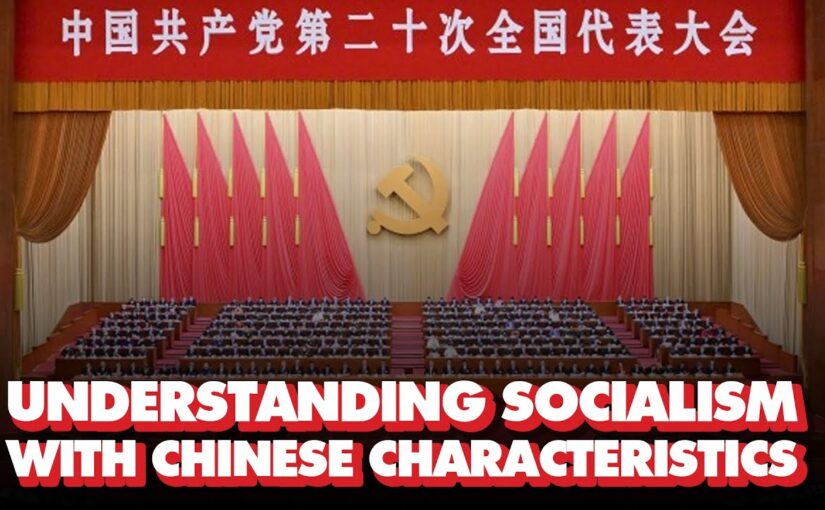In this very interesting and detailed discussion, Roland Boer and Ben Norton delve into a number of the key issues from Roland’s book Socialism with Chinese Characteristics: A Guide for Foreigners. The core of the discussion is around answering the left critique of China’s post-1978 economic reforms: that these constitute a return to capitalism; that Deng Xiaoping and his colleagues were capitalist roaders who sought to overturn socialism via the introduction of market mechanisms.
Roland points out that markets go back thousands of years, long pre-dating capitalism. As such, there’s no equals sign between capitalism and markets; markets existed before capitalism and they can exist after capitalism. The question for socialists is how to use markets within a socialist context; how to use market mechanisms within a framework of an overall planned economy which is directed at meeting the immediate and long-term needs of the people, and preparing the ground for an eventual transition to a classless society.
Roland makes an important distinction between two key aspects of socialism: that of common ownership of the means of production, and liberation of the productive forces. The two do not necessarily always advance in neat and predictable correlation. This is something that is understood by all existing socialist societies – in China, Vietnam, Cuba, Laos and the DPRK. Deng Xiaoping and his colleagues understood very well that a high level of the productive forces was a material prerequisite for China’s development of an advanced socialism and ultimately for communism. The whole purpose of the reform process has been to develop China’s productive forces whilst simultaneously pursuing the fundamental socialist objective of improving people’s lives. On both counts, the process has been phenomenally successful.
Ben contrasts the level of development and living standards in India and China, noting that hundreds of millions in India continue to face devastating poverty, while China is responsible for at least 70 percent of all poverty alleviation in the last four decades. He points out that this disparity is primarily a manifestation of the two countries having different social systems.
The two take on a number of other key questions, including the nature of socialist democracy, the treatment of migrant workers, the household responsibility system, corruption, and the consolidation of Marxism in China under the leadership of President Xi Jinping.
The video was first posted on Ben’s Geopolitical Economy Report channel.


Boer nails the farce! He said in 2017, “The combination of Confucian and Marxist ethics entails an expectation of almost impeccable morality – speaking plainly and directly, being honest, living simply, avoiding any sign of personal gain, and substantially focused on the public good.”
Confucian ethics were promoted by mandarins, sons of the gentry who extorted huge rents from peasants, leaving them hungry every day. And now the “Communist” Party of China is riddled with fantastic corruption, as the endless exposés reveal, while 200 million workers migrate the country to sell their labor power and go into sweatshop factories, construction sites, and gig work delivering food and parcels.
Has Mr. Charles A. had a look at the book he so confidently speaks about? I bought it about a week ago and have made a book application that will soon be published on the Norwegian online magazine steigan.no. My book report, like Roland Boer’s book, begins with a quote by Mao Zedong:
“Some foreigners say our ideological reform is brainwashing. As I see it, they are right in what they say. It’s washing brains, it is what it is! My brain has been washed to become what it is now. After joining the revolution, it was slowly washed, it was washed for several decades. All that I received before was bourgeois education, and even some feudal education.”
Roland B. continues:
“Mao spoke to Chinese students studying in Moscow in 1957, but his words resonate to this day. At least for me, the in-depth study of Chinese Marxism, of socialism with Chinese characteristics, has required a washing of my brain, a wash that has taken a dozen years or more. Why? When I first came to China, I thought I was open, thought I wasn’t adopting the frameworks and assumptions with which I had been raised and educated. How wrong I was. Like other foreigners, I had developed an opinion about China that was quite inaccurate. This is especially true for the small number of countries that make up the “West” (which contains about 14% of the world’s population). I have found that those who have grown up in socialist countries—past and present—find it much easier to understand socialism with Chinese characteristics. This is also the case for the many who come from developing countries, for there is also there a vivid memory of the experience of colonial devastation at the hands of the ‘West’. So if you’re like me, having been raised and educated in one of the few Western countries, you may well have to participate in a process of washing your brain in order to understand socialism with Chinese characteristics, or Marxism with Chinese characteristics.”
The book is expensive but very worth reading. But of course there is a risk that Charles brain will also be somewhat washed from the bourgeois prejudices with which all three of us were brought up.
But of course Charles; socialism is hard work towards communism. It is hard work with setbacks, and Roland Boer writes about them.